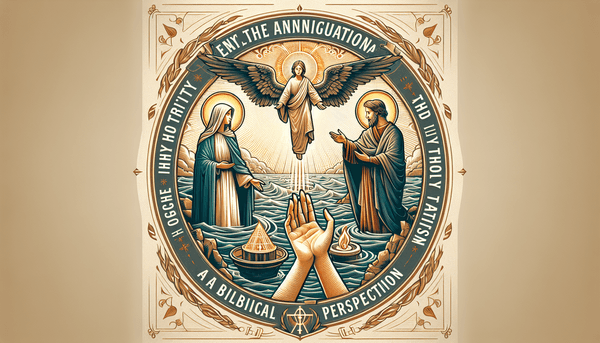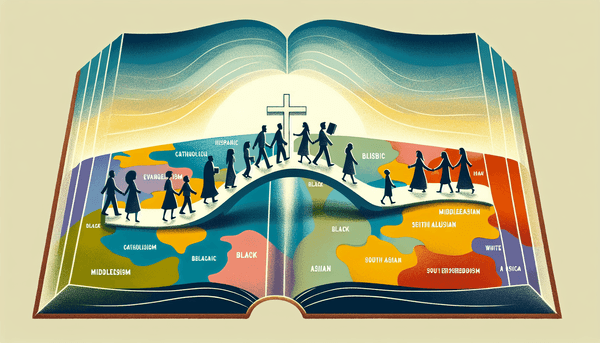Being Gay and Christian
The question of whether one can be gay and a Christian is a topic of significant debate within the Christian community. It's a topic that requires us to examine scriptural passages like 1 Corinthians 6:9-10, which some interpret to mean that homosexual behavior is not in line with God's teachings. However, the essence of Christianity is rooted in the commandment given by Jesus in John 13:34, to love one another as He has loved us. This love calls us to show compassion and seek understanding. While Romans 3:23 reminds us that we are all sinners in need of God's forgiveness, the fruits of the Spirit, which include love, joy, peace, patience, kindness, goodness, faithfulness, gentleness, and self-control (Galatians 5:22-23), are what we are encouraged to embody. In a world quick to judge, Matthew 7:1-2 advises us to look first to our own imperfections before passing judgment on others, emphasizing the need for humility and empathy in our interactions.
Understanding the Book of Genesis
The Book of Genesis is not only the first book of the Bible but also a foundational narrative that provides context for the entire biblical story. It is divided into the primeval history, which includes the creation of the world and the fall of man, and the patriarchal history, which narrates the lives of the forefathers of the faith. Genesis 1:1 introduces us to a sovereign God who creates the heavens and the earth, setting the stage for humanity's entrance into a world designed with intention and purpose. The fall of Adam and Eve, as described in Genesis 3:6-7, marks the beginning of humanity's complex relationship with sin and redemption. The covenant with Abraham, detailed in Genesis 12:1-3, and the story of Joseph, who saw God's providential hand in his life (Genesis 50:20), illustrate themes of faith, trust, and the enduring mercy of God. These narratives are not just historical accounts but lessons on the continuity of God's love and the promise of redemption, despite human failings.
Navigating Relationships with Non-Christians
Relationships with non-Christians, especially romantic ones, can present challenges to Christians. The Bible offers guidance, such as in 2 Corinthians 6:14, which warns against being 'unequally yoked' with unbelievers, yet also commands us to love our neighbor as ourselves (Mark 12:31). These relationships require open communication, mutual respect, and a willingness to understand and honor each other's beliefs. While navigating such relationships, Christians are encouraged to turn to prayer (Philippians 4:6) and seek wisdom through the counsel of others (Proverbs 15:22). These scriptures don't provide easy answers but call for a discerning heart and a commitment to living out one's faith with integrity while respecting the spiritual journey of others.
The Significance of the Crucifix in Christianity
The crucifix, or 'Kruzifix' in some traditions, is a powerful symbol in Christianity that represents the sacrificial love of Jesus and the redemption He offers. 1 Corinthians 1:18 speaks to the message of the cross being the power of God to those who are being saved. The crucifixion, as told in John 19:18, is central to the Christian faith, signifying Jesus's ultimate act of humility and obedience to death on a cross (Philippians 2:8). For many believers, the crucifix is a visual reminder of the faith's founder, who is described in Hebrews 12:2 as the pioneer and perfecter of faith. It is through the lens of Galatians 6:14 that some Christians understand the importance of boasting only in the cross of Christ, recognizing its profound significance in their spiritual lives.
Conclusion
Our expedition through the heart of Christianity reveals a faith rich with questions, challenges, and the constant call to deeper understanding. We are reminded that the core of our beliefs is grounded in love, compassion, and grace, which guide us in all our interactions and decisions. As we have seen, whether it is reconciling our identity with our faith, interpreting the stories of Genesis, managing interfaith relationships, or understanding the religious significance of symbols like the crucifix, the Bible provides us with principles and teachings that invite reflection and application. In this journey, engaging with the depths of righteousness, law, and ethics in the Bible can further illuminate our path. We encourage you, the reader, to continue engaging with the Bible, your faith community, and the wider world to navigate the complexities of a Christian life that is both faithful to its teachings and responsive to the diverse world in which we live.
FAQ
Q: Is it okay to be gay and be a Christian?
A: Being a Christian involves grappling with various aspects of identity and belief. The Bible has passages that challenge homosexual behavior, but it also calls for love and compassion. Christians are encouraged to seek understanding and to remember that all are sinners in need of forgiveness (Romans 3:23).
Q: What is the significance of the Book of Genesis in the Bible?
A: The Book of Genesis is foundational in understanding the Bible's narrative, revealing the creation of the universe, the fall of humanity, and God's covenantal relationship with His people through stories of figures like Abraham and Joseph.
Q: Can a Christian date a non-Christian?
A: Christians are advised to approach relationships with non-Christians with caution, seeking wisdom and guidance through prayer and counsel. While the Bible advises against being 'unequally yoked' (2 Corinthians 6:14), it also emphasizes the importance of love and respect (Mark 12:31).
Q: What does the crucifix represent to Christians?
A: The crucifix is a profound symbol of Jesus's sacrifice and the salvation He offers. It represents the power of God (1 Corinthians 1:18) and is central to the Christian faith, reminding believers of Jesus's humility and obedience (Philippians 2:8).






